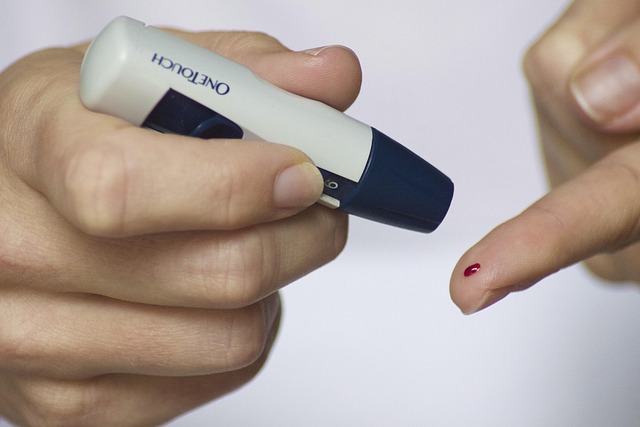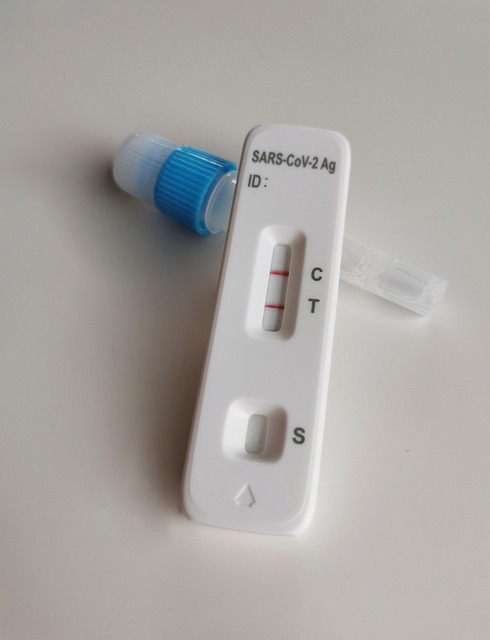Thyroid function test kits are vital for healthcare professionals to diagnose and manage thyroid conditions accurately. These kits measure hormones like T3, T4, and TSH, with interpretation needing kit component knowledge. Over-the-counter access is growing, but expert guidance remains crucial for precise results and personalized care. Advanced kits offer digital readers and apps for faster analysis, beneficial for childhood disorders. Normal TSH levels indicate optimal thyroid function, while deviations may signal health issues. Sensitivity, accuracy, testing range, and resolution are key selection factors, with reviews guiding choices. User-friendly design is essential, catering to clinical or home settings. Practice needs, patient demographics, and desired capabilities guide kit selection, with age-specific considerations crucial for senior practices.
“In the realm of healthcare, accurate diagnosis is paramount, especially for conditions like hypothyroidism and hyperthyroidism. This article guides healthcare providers through the process of comparing thyroid function test kits, offering a comprehensive overview of essential components, test types, and sensitivity. From understanding the key markers of thyroid health to considering user-friendly designs, we explore what constitutes an ideal thyroid function test kit for precise patient assessment. By the end, you’ll be equipped to make informed decisions for your practice.”
- Understanding Thyroid Function Test Kits
- Key Components of a Comprehensive Kit
- Types of Thyroid Hormone Tests
- Sensitivity and Accuracy Considerations
- User-Friendly Design for Healthcare Providers
- Choosing the Right Test Kit for Your Practice
Understanding Thyroid Function Test Kits

Thyroid function test kits are essential tools for healthcare providers to assess and diagnose thyroid-related disorders. These kits typically measure specific hormones and markers in the blood, providing valuable insights into thyroid health. Understanding the components and functionality of these test kits is crucial for accurate interpretation of results.
When to take a thyroid test often depends on symptoms presented by patients, such as fatigue, weight fluctuations, or metabolic changes. TSH hormone testing kits are commonly used initially to evaluate thyroid function. Over-the-counter thyroid support has gained popularity, offering an accessible way for individuals to monitor their thyroid health between clinical visits. However, proper guidance and consultation with healthcare providers remain vital for interpreting results accurately and determining the best course of action.
Key Components of a Comprehensive Kit

A comprehensive thyroid function test kit should include a range of essential components to ensure accurate and reliable results. Firstly, it must contain high-quality test strips or well plates designed to detect specific thyroid hormones like T3, T4, and TSH. These hormones play a pivotal role in regulating metabolism and overall body functions, making their precise measurement crucial for healthcare providers.
Additionally, the kit should provide clear instructions tailored for both healthcare professionals and patients, especially when conducting thyroid blood tests. This includes detailed guidelines on specimen collection, storage, and handling to maintain sample integrity. Some advanced kits may also offer digital readers or apps that facilitate data interpretation, allowing for faster and more efficient analysis of childhood thyroid disorders and other related conditions.
Types of Thyroid Hormone Tests

Thyroid function test kits play a crucial role in evaluating thyroid health and TSH levels. There are primarily two types of hormone tests: T3 (triiodothyronine) and T4 (thyroxine). The most common test, however, measures TSH (thyroid-stimulating hormone), which is produced by the pituitary gland to regulate thyroid function. Healthcare providers often use these tests to diagnose thyroid conditions like hypothyroidism or hyperthyroidism, monitor patients on thyroid medication, or refer them to a thyroid specialist near me for further assessment.
TSH levels within a normal range indicate that the thyroid gland is functioning optimally. Elevated TSH may suggest hypothyroidism, while low TSH can signal hyperthyroidism. Additionally, some test kits offer measurements of free T3 and free T4, which provide insights into the bioavailability of these hormones in the body. This detailed analysis aids in personalized thyroid medication monitoring, ensuring optimal treatment for each patient’s unique needs.
Sensitivity and Accuracy Considerations

When comparing thyroid test kits for healthcare providers, sensitivity and accuracy are paramount considerations. These factors determine how well the kit can detect subtle changes in thyroid function, which is crucial for diagnosing conditions like hypothyroidism or hyperthyroidism early on. A high-sensitivity thyroid function test kit should be able to provide accurate results even with low hormone levels, ensuring that healthcare providers get reliable data to make informed decisions about patient care.
One key aspect to look into is the testing range and resolution of the kit. A broader range ensures that a wider spectrum of thyroid function values can be measured accurately. Additionally, kits with higher resolution offer more precise readings within a given range, further enhancing diagnostic capability. Reviews of thyroid test kits often highlight these features, making it beneficial for healthcare providers to refer to thyroid test kit reviews when selecting the most suitable kit for their practice, focusing on both the testosterone test online and the overall thyroid function test accuracy.
User-Friendly Design for Healthcare Providers

A user-friendly design is a key consideration when choosing a thyroid function test kit for healthcare providers. Kits that are intuitive and easy to use can significantly streamline the testing process, reducing potential errors and improving overall efficiency in clinical settings. Look for features like clear instructions, well-designed controls, and consistent color-coding, which have been shown to enhance accuracy and speed up turnaround times.
This is particularly important when comparing at-home vs clinic testing. Home thyroid function test kits should be designed with the end-user in mind, ensuring that patients can reliably obtain accurate results without professional assistance. In contrast, clinical settings may benefit from more advanced or specialized kits tailored to frequent thyroid screening, such as those used during pregnancy thyroid screening, which often require precise and consistent measurements.
Choosing the Right Test Kit for Your Practice

Choosing the right thyroid function test kit is a crucial step for healthcare providers looking to offer accurate and efficient assessments of their patients’ thyroid health. Several factors come into play when making this decision, such as the specific needs of your practice, patient demographics, and desired testing capabilities. For instance, practices catering primarily to seniors might opt for kits that cater to the unique thyroid considerations of older adults, like adjusting for changes in hormone levels associated with aging.
Additionally, understanding how to prepare patients for the test and interpreting results effectively is paramount. Healthcare providers should consider kits that come with clear instructions for patient preparation, ensuring optimal specimen quality. A normal TSH range chart can be a valuable tool for comparing and validating test results, especially when evaluating thyroid function in both young and elderly patients.
When selecting a thyroid function test kit, healthcare providers should consider sensitivity, accuracy, user-friendliness, and specific test types to ensure optimal results. By evaluating key components and choosing the right kit for their practice, providers can offer reliable and comprehensive thyroid assessments, facilitating better patient care and management. Incorporating advanced test kits into clinical settings enhances diagnostic capabilities, allowing for more effective navigation of thyroid health challenges.
